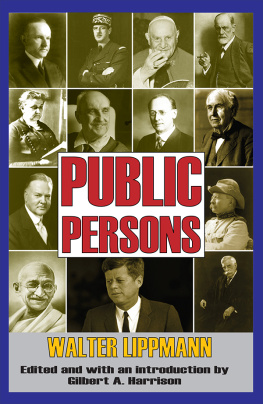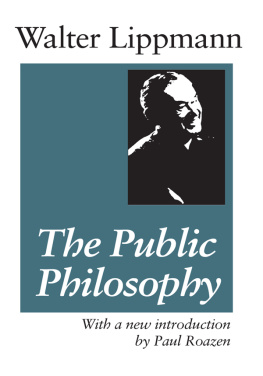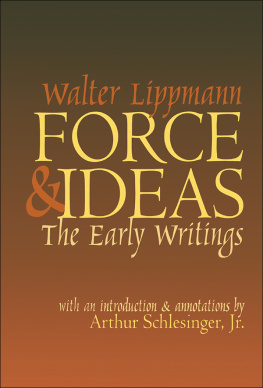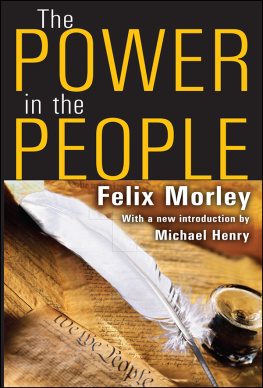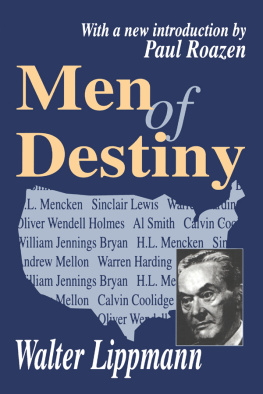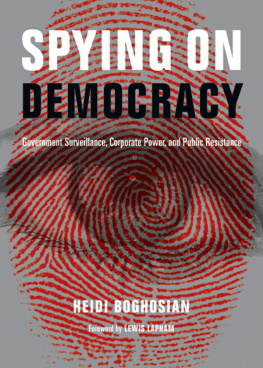First published 2010 by Transaction Publishers
Published 2017 by Routledge
2 Park Square, Milton Park, Abingdon, Oxon OX14 4RN
711 Third Avenue, New York, NY 10017, USA
Routledge is an imprint of the Taylor & Francis Group, an informa business
Copyright 1976 by Liveright Publishing Company
All rights reserved. No part of this book may be reprinted or reproduced or utilised in any form or by any electronic, mechanical, or other means, now known or hereafter invented, including photocopying and recording, or in any information storage or retrieval system, without permission in writing from the publishers.
Notice:
Product or corporate names may be trademarks or registered trademarks, and are used only for identification and explanation without intent to infringe.
Library of Congress Catalog Number: 2009050273
Lippman, Walter, 1889-1974
Public Persons/Walter Lippmann
p. cm.
Originally published: New York: Liveright, c1976.
Includes bibliographical references and index
ISBN: 978-1-4128-1061-6 (alk. paper)
1. United StatesBiography. I. Title.
CT220.L56 2010
920.073--dc22
2009050273
ISBN 13: 978-1-4128-1061-6 (pbk)
codeMantra LLC
Walter Lippmanns work so fulfilled his talents that it is hard to imagine his having been anything but what he was, the model political journalist, successful from the start. He was the most brilliant man of his age in all the United States, in the opinion of Theodore Roosevelt; mature at twenty-three, when most of us were floundering about in a prolonged adolescence, according to his Harvard contemporary Van Wyck Brooks. Even his New Republic colleague, Francis Hackett, whose romanticism ran counter to Lippmanns realism, had to say that he was wide-awake at the age of twenty-four up bright and early like the sun in the South.
Born September 23, 1889 in New York City where he died December 14, 1974, Lippmann was the only child of prosperous German Jewish parents. He attended a select boys academy, Sachs Institute, and at thirteen wrote his first published article for the school Record, a mournful description of an Italian convict being led to his execution. At Harvard, completing the four-year course in three years and graduating Phi Beta Kappa in 1910, Lippmann joined the socialist club, an infatuation that lasted only a few years. He studied under Graham Wallas, whose thought marked him permanently. Wallas book, The Great Society, was dedicated to Lippmann.
Had he chosen an academic career, Lippmann would have done well at it. He read widely, he was articulate, he enjoyed the play of ideas. But classroom teaching seems never to have occurred to him and would probably not have satisfied his more worldly tastes. He wanted to be in the swim, and he was. He wanted lively company, including the company of the eminent, and he had it. He was acquainted with every President from Theodore Roosevelt to Richard Nixon, and in the 1920s traveled once a week by train from New York to Washington for lunch at the White House with Calvin Coolidgea loquacious man, he reported, not profoundly troubled by the troubles of others. He vacationed with the Lamonts, visited Bernard Berenson in Italy, was the guest of Khrushchev on the Black Sea, and was welcome at the Elyse Palace in Paris. Statesmen sought and were given his counsel, though Lippmann firmly insisted that a certain distance be kept between public officials and newspapermennot a wall or fence, but an air space.
His schedule, one admirer remarked, was worked through with the regularity of a railroad; he gets more done in a day than the whole population of England. Lippmann worked wherever he wasBar Harbor, Maine in the summer, Europe in the spring, and New York or Washington the rest of the year. Idleness bored him, and the thought of retirement appalled him. Throughout his life what he did, essentially, was to study and describe how we are governed and how we might be better governed, and for half a century a large number of Americans did not know what they thought about those questions until Lippmann told them.
He never learned to type. His articles were written in a small, nearly illegible script, and in later years were read into a dictating machine and transcribed. They were sometimes revised extensively and sometimes barely touched, depending on the complexity of the subject and his familiarity with it. Whatever the subject, he had his theme clearly in mind before pen was put to paper.
With the mornings reading and writing done, Lippmann dressed for lunch, usually at the Metropolitan Club in Washington or the Century Club in New York, and always preceded by a cocktail. His guest had the full attention of a gifted listener, for Lippmann was probably the only newspaperman of his time, as Philip Geyelin of The Washington Post has recalled, who could get away with sitting back after the preliminary courtesies with a foreign minister or head of state, folding his arms and simply saying nothing. The effect on some of the strongest of his subjects was to make them blurt out their innermost confidences in a desperate effort to fill the void.
After lunch, Lippmann rested, played golf with his wife Helen (croquet or tennis if they were at Bar Harbor), walked their large black poodle, or went to a movie. This was followed by a dinner party from which the Lippmanns departed when Walter had heard all he cared to hear, which could be quite early.
At its peak, his column Today and Tomorrow reached 13 million readers and was the most influential political commentary in the country. It was not used as a platform for exhortation. Instead, in a dispassionate tone, the column explained what was happening in Washington or in some other world capital, why it was happening, and where a given policy was likely to lead. Confidences were respected, and unless he was reporting a lengthy interview with someone like Charles de Gaulle, he did not reveal what prominent personages had told him.
Although numerous in the 1920s and 1930s, his outside articles and speeches were rarities by the 1960s, by which time he had a rule against accepting any honorary degree that required his delivering an address.
Lippmann shrewdly assessed the value of his reputation; it was not to be squandered on trivial topics or audiences, or lost causes. Nor, to the disappointment of more partisan-minded friends, would he allow his personal preferences to determine his public judgments. Many hoped he would support the presidential candidacies of Adlai Stevenson in 1952 and Eugene McCarthy in 1968 were they not, after all, his sort of men, thoughtful and urbane? They were, but Lippmann endorsed their Republican opponents. He did so in the first instance because he believed that General Eisenhower would make the Republican party responsible, and would quickly end the war in Korea without domestic recriminations; in the second instance he believed that Richard Nixon would do the same in Indochina. He was fifty percent right. He did not apologize for being wrong, assuming that his readers understood that he was writing to pressing deadlines, and in the light of information then at hand.

